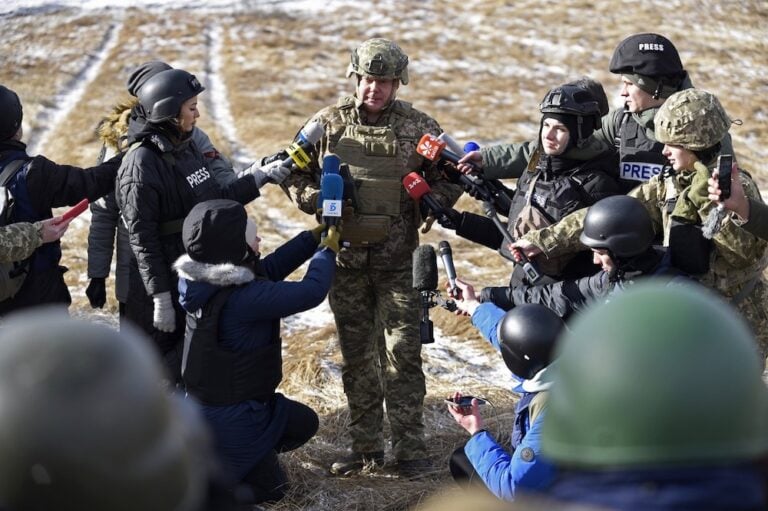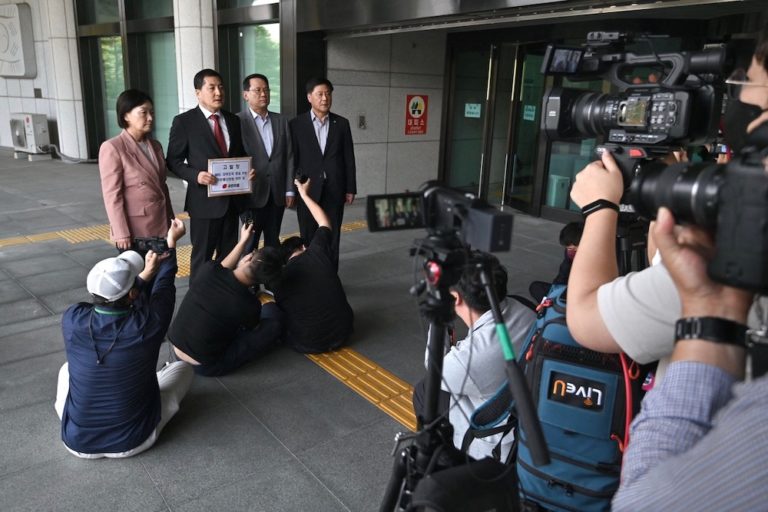(IPI/IFEX) – The following is an IPI letter to South Korean President Kim Dae Jung decrying the recent use of libel laws to silence the press: His Excellency Kim Dae-jung President Office of the President Seoul South Korea Vienna, 18 February 2000 Your Excellency, The International Press Institute (IPI), the global network of editors and […]
(IPI/IFEX) – The following is an IPI letter to South Korean President Kim Dae Jung decrying the recent use of libel laws to silence the press:
His Excellency Kim Dae-jung
President
Office of the President
Seoul
South Korea
Vienna, 18 February 2000
Your Excellency,
The International Press Institute (IPI), the global network of editors and media executives, has been informed about an incident which organisations defending freedom of expression and freedom of the press must regard as unfortunate and serious. The fact that an editorial published on 31 July 1999 by the Chosun Ilbo resulted in a libel law suit filed collectively by 12 prosecutors from the Seoul District Prosecution Office on 6 September 1999 as a reaction to this editorial raises several problems.
The legal aspects:
In democratic countries it is generally understood that public officials and/or institutions seeking redress must prove that the press had committed defamation with malice. This means that the author had actual knowledge that the statement in question was false or reckless and published the article disregarding these facts.
The Prosecutor’s Office is part of the governmental executive system. Public institutions and elected officials must accept a much more robust stance and accept criticism for the sake of an open debate on public issues. The prosecution as a public institution cannot have its reputation and dignity damaged in the same way that an individual can. Collective charges against media remind us of the unfortunate case of the Croatian government (23 ministers suing a paper – which was later acquitted – under the defamation law).
The journalistic aspects:
An editorial is a statement of opinion; the editorial only raised doubts regarding possible wire tapping within the prosecution and did not implicate 12 prosecutors as individuals responsible for it. How could they feel defamed by such an editorial? According to international standards, this article is not in any way defamatory.
Moreover, the government and the opposition parties have begun legal discussion on the issue of phone tapping. This obviously is a pressing issue in the public interest. Such legal actions could only serve to stifle the public debate.
The financial aspects:
The prosecution was seeking 3 billion Korean Won (approx. US$ 3,2 million) in damages. Large punitive fines on news media, out of all proportion to any actual damage inflicted, are a clear threat to freedom of expression. This issue of disproportionate claims was identified by almost a dozen international press freedom organisations and professional organisations as one of the new faces of censorship in the 21st Century.
As President of the NCNP you have yourself stopped a case of disproportionate claims (the Hanyoreh Shinmun case).
In its ruling on 2 February 2000, the Seoul District Court handed down a ruling, ordering payment of 180 million Won. We were very pleased to note that the court also realised how disproportionate the original claim was. Nevertheless, we are convinced that the editorial did not breach any defamation law and that no sanctions should be applied.
Mr. President, you are aware that this case could do damage to your country’s international reputation. The international community, human rights organisations as well as business institutions are nowadays regarding freedom of expression as the basic ingredient for progress and development. The United Nations, as well as the World Bank and other institutions have time and again expressed their commitment towards such principles.
May we therefore urge you to use your moral authority to ensure that government officials do not file similar libel lawsuits in the future, and also to ensure that the wire tapping legislation is implemented as soon as possible. We further hope that the Chosun Ilbo, which is appealing the decision, will be acquitted. It is important that the verdict by the court of appeals is in line with international standards of press freedom, as otherwise this case could set a dangerous precedent.
Yours sincerely,
Johann P. Fritz
Director
Recommended Action
Similar appeals can be sent to:
His Excellency Kim Dae Jung
President
Office of the President (Blue House)
1 Sejong-ro Chongro-gu
110-050 Seoul
South Korea
Fax: +82 2 855 1913
E-mail page: http://www.bluehouse.go.kr/e_mail_president.htmlPlease copy appeals to the source if possible.


